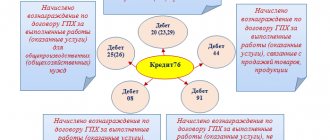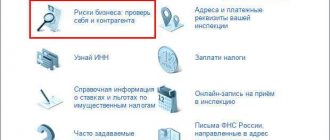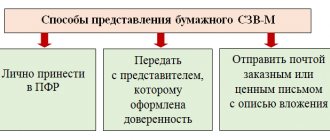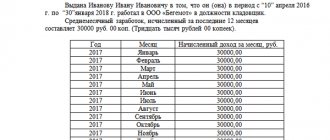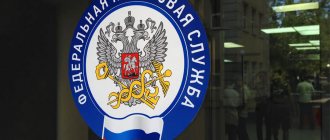The obligation to restore VAT, declared as a deduction in previous tax periods, arises for an LLC or individual entrepreneur in cases clearly stated in Articles 170 and 171 of the Tax Code of the Russian Federation.
Tax restoration means transforming the declaration and sales ledger, increasing the amount of VAT required to be paid to the state treasury.
The mechanism for recalculating VAT and the immutability of its implementation in practice give rise to many disputes with tax authorities, obliging taxpayers to return VAT to accounting even in situations that are not described in the Tax Code of the Russian Federation.
When VAT restoration is inevitable
The list of circumstances under which a taxpayer will not be able to avoid mandatory tax restoration is regulated by law:
- previously acquired property becomes part of the authorized capital of another company;
- the occurrence of business transactions that do not require VAT to be charged;
- refund of prepayment for unfulfilled delivery or purchase;
- cheaper products;
- execution of export actions;
- receiving federal subsidies.
Important: The amount of VAT should be reassessed and corrections made in the accounting registers in the time period when the property began to be used for VAT-free purposes.
Operating in a tax-free environment
When combining several tax regimes - OSN and simplified taxation (USN, UTII) - the acquired property, on which VAT was deducted, can be used in various business transactions - both taxable and tax-free.
In such situations, the “input” tax should be distributed by type of activity and the part of it that went to operations under the preferential regime should be restored.
The period in which the tax should be restored depends on the period of time when the VAT-free transactions occurred.
If this event occurred in the 1st month of the quarter, then the accountant needs to go back to the previous tax period and make an adjustment there to restore the tax. If VAT exemption occurs in 2-3 months of the quarter, restoration should take place within the same period.
You need to remember: The restored tax must be taken into account as part of other expenses in correspondence with account 68.
When an enterprise or individual entrepreneur operates only under OSNO, but one-time non-taxable transactions arose in the process of activity, then input VAT on the proceeds should be restored in full in the same reporting period.
Participation in the authorized capital of another company
If an LLC or an entrepreneur using the general taxation regime has decided to contribute material resources to the authorized capital of another organization or to the fund of an investment partnership/cooperative, then action is required to restore VAT.
This is explained by the fact that “incoming” contributions are not subject to taxation, and the tax has already been claimed for deduction in previous declarations.
You should know: VAT restoration is not required when making property contributions to simple partnerships or mutual funds (mutual investment funds).
For non-depreciable property, VAT is returned to accounting in full, but for fixed assets and intangible assets the approach changes - VAT is returned only on the depreciated cost. Any manipulations to revaluate the operating system are not provided for by law.
Restoration of VAT on property contributed as a contribution or contribution
In transactions with property used as a deposit or contribution, VAT is restored:
- When using property, intangible assets to contribute to the authorized capital of business companies, partnerships or contributions to mutual funds of cooperatives. The exceptions are contributions of property to mutual investment funds (letter of the Ministry of Finance of Russia dated January 15, 2008 No. 03-07-11/09) and contributions under a simple partnership agreement (Resolution of the Presidium of the Supreme Arbitration Court of the Russian Federation dated June 22, 2010 No. 2196/10).
- When using property and intangible assets for contributions under an investment partnership agreement.
- When using property to replenish the target capital of a non-profit organization in accordance with Federal Law dated December 30, 2006 No. 275-FZ “On the procedure for the formation and use of target capital of non-profit organizations.”
VAT is restored in the period that corresponds to the date of the document on the transfer of property in full.
Fixed assets and intangible assets are an exception to this rule: for this type of property, restoration occurs in a part proportional to the residual value without revaluation (paragraph 2, paragraph 1, paragraph 3, article 170 of the Tax Code of the Russian Federation). At the same time, Chapter 21 of the Tax Code of the Russian Federation does not establish rules for determining the residual value of fixed assets. The Ministry of Finance of Russia believes that it is necessary to form the residual value in accounting by reducing the residual value by the amount of the revaluation, adjusted to take into account depreciation (letter of the Ministry of Finance of Russia dated 02.08.2011 No. 03-07-11/208).
The restored VAT must be indicated in documents on the transfer of property (property rights) and intangible assets. These documents are the basis for accepting an object for accounting and VAT amounts for deduction if the object is used in transactions subject to VAT (paragraph 3, paragraph 1, paragraph 3, Article 170, paragraph 11, Article 171, paragraph 8 Article 172 of the Tax Code of the Russian Federation, letters of the Ministry of Finance of Russia dated November 21, 2011 No. 03-07-11/317 and November 11, 2009 No. 03-07-11/294). The seller of the property cannot take into account the amount of restored VAT in income tax expenses (letter of the Ministry of Finance of Russia dated 02.08.2011 No. 03-07-11/208).
The seller does not issue an invoice for the transferred property, so it is not required to deduct VAT (Clause 3, Article 169, Clause 1, Clause 2, Article 146, Clause 4, Clause 3, Article 39, Clause 1, Art. 172, paragraph 1, paragraph 3, article 170 of the Tax Code of the Russian Federation). However, this does not relieve the obligation to register in the purchase book the documents on the basis of which the transfer is made.
When the buyer made an advance payment
An LLC or individual entrepreneur using a prepayment scheme is required to issue an invoice to the counterparty for the entire amount of the advance received. There are two scenarios in which the buyer who received the deduction will be required to restore the tax on the payment received:
- by agreement between the parties, the advance payment is returned to the buyer;
- The ordered products are sent against the amount of money transferred in advance.
Important: If the cost of goods in the shipping documents corresponds to the amount of the advance payment, then VAT is refunded in full. If there is a discrepancy in the amounts, VAT is recalculated from the total amount specified in the invoice for the shipment of goods.
Restoration of VAT on goods (works, services, property rights) when their value decreases
If after the acquisition of goods (work, services, property rights) there is a decrease in value, quantity, tariff, then the VAT previously accepted for deduction for this transaction must be restored (clause 4, clause 3, article 170 of the Tax Code of the Russian Federation). Restoration must be made to the earliest date:
- the date of receipt of the adjustment invoice for the reduction in the cost of goods (work, services, property rights);
For details, see the material “What is an adjustment invoice and when is it needed?”
- the date of receipt of primary documents confirming the decrease in the value of goods (work, services, property rights).
In this case, the difference between the VAT amounts before and after the change in value is restored (paragraph 2, paragraph 4, paragraph 3, Article 170 of the Tax Code of the Russian Federation).
Export operations
Since 2015, tax legislation has changed the requirements for the restoration of VAT in relation to export transactions. Direct requirement to restore the tax after shipment of goods to foreign partners, Art. 170 of the Tax Code of the Russian Federation does not contain.
However, VAT can be deducted on goods intended for export only after the taxpayer presents to the tax inspectorate a package of documents justifying the application of a zero tax rate.
If a deduction for an exported product was declared earlier, at the time of its acquisition by the exporter, then the VAT restoration date should be the day when the cargo crossed the Russian border.
Registration
According to the inspectors, VAT needs to be restored in a number of cases.
For example, in case of theft, destruction, confiscation of goods, etc.
Officials claim that the “input” VAT in these cases is subject to restoration, since stolen (destroyed, confiscated, etc.) goods are no longer used in activities subject to VAT (letters of the Ministry of Finance of the Russian Federation dated July 4, 2011 No. 03-03 -06/1/387, Federal Tax Service of Russia for Moscow dated November 25, 2009 No. 16-15/123920.1).
However, arbitration courts take a different point of view. The Code obliges people to pay only legally established taxes. This means that the restoration of VAT, previously legally accepted for deduction, must be provided for by law. Cases in which it is necessary to restore the tax are listed in paragraph 3 of Article 170 of the Tax Code. This list is closed. Consequently, the obligation to restore VAT amounts not provided for by the code is illegal (decisions of the Supreme Arbitration Court of Russia dated May 9, 2011 No. 3943/11, dated October 23, 2006 No. 10652/06).
Not mentioned in paragraph 3 of Article 170 of the Tax Code is the disposal of property as a result of a fire. On this basis, in a letter dated May 21, 2015 No. GD-4-3/8627, the Federal Tax Service of Russia concluded that the VAT previously accepted for deduction on burnt property does not need to be restored.
However, in most cases, officials interpret the provisions of the Tax Code regarding the restoration of VAT in their favor. In a letter dated August 17, 2015 No. 03-07-11/47347, the Ministry of Finance expressed the opinion that if the goods were not delivered and the advance payment was not returned, the VAT accepted for deduction when transferring the advance must be restored at the time of writing off the receivables.
Financiers justify their position by the fact that tax amounts on goods that are used to carry out only transactions subject to VAT are subject to deductions (clause 2 of Article 171 of the Tax Code of the Russian Federation). But if the goods are not used in transactions subject to this tax, then the VAT deduction cannot be applied.
Since in the situation under consideration the delivery of goods did not take place, therefore, there are no grounds for deducting VAT. According to the Ministry of Finance, the buyer must restore the VAT accepted for deduction when transferring an advance payment to the supplier for the upcoming delivery of goods.
This is done when writing off receivables that arose in connection with the transfer of an advance payment to the supplier, financiers note.
However, based on a literal reading of paragraph 3 of Article 170 of the Tax Code, VAT restoration in the case under consideration is not required. After all, this situation is not mentioned in the closed list of tax restoration options listed in this norm.
Thus, the Tax Code does not provide for the write-off of receivables in the amount of the advance paid for a failed delivery as a basis for VAT restoration.
However, if the buyer does not restore the tax, claims may arise from inspectors. The taxpayer will have to defend his position in court, but given the established arbitration practice, the likelihood of the dispute being resolved in his favor is quite high.
Here are examples of arbitration cases lost by tax authorities:
- The tax inspectorate demanded that the company restore VAT, previously accepted for deduction, on the stolen property. However, judges of all instances considered this requirement illegal and refused the tax authorities (resolution of the Federal Antimonopoly Service of the Moscow District dated November 16, 2010 No. KA-A40/13770-10);
- The decision of the tax inspectorate regarding the additional assessment of VAT, penalties and fines was recognized as illegal, since such a basis as write-off or destruction of inventory items as a result of expiration is absent in paragraph 3 of Article 170 of the Tax Code (resolution of the Federal Antimonopoly Service of the Far Eastern District dated December 27, 2010 No. Ф03-8694/2010);
- the judges decided that (resolution of the Federal Antimonopoly Service of the Volga District dated January 27, 2011 in case A55-7952/2010);
- The tax inspectorate demanded that the company restore VAT on goods not used in taxable transactions due to defects. By Resolution of the Federal Antimonopoly Service of the Volga Region dated November 30, 2010 No. A55-33697/2009, the decision of the tax authorities was declared invalid;
- The tax inspectorate demanded that the organization restore VAT on goods lost due to the fire. Judges of three instances recognized such a requirement as illegal, and the corresponding decision of the inspectorate as invalid (resolution of the Federal Antimonopoly Service of the Moscow District dated December 25, 2013 No. F05-16440/2013 in case No. A40-34818/13);
- the organization purchased goods for resale and claimed the VAT claimed as a deduction. However, then an independent examination was carried out in relation to part of the goods, during which it was established that the goods were illiquid. Unliquid goods are written off and sent to a landfill. The tax inspectorate demanded that the organization restore VAT on these goods. However, the court sided with the company (resolution of the Federal Antimonopoly Service of the North Caucasus District dated May 7, 2014 No. A32-18211/2012).
Reducing the price of goods already received by the buyer
The supply agreement between the buyer and seller may contain a clause under which the supplier provides a discount on goods shipped in previous periods. After the price of the product has been reduced, the buyer must recover VAT on the difference between the new price and the one indicated in the shipping documents.
Attention! The new cost of the goods, taking into account the discount provided, must be recorded in the agreement, which will be the basis for adjusting VAT.
The tax restoration at the reduced value is reflected in account 60, intended to record the status of settlements with suppliers.
Recovering VAT from advances received
The prepaid payment system involves receiving an advance payment and paying VAT on these amounts by the seller. The buyer has the right to accept these amounts for deduction (clause 1 of Article 154, clause 12 of Article 171, clause 9 of Article 172 of the Tax Code of the Russian Federation).
From 01.10.2014, the procedure for VAT restoration has been changed: the amount of VAT previously claimed for deduction on the basis of an advance invoice received from the seller is restored by the buyer in full if the shipment is equal to or exceeds the amount of the advance, and is restored in accordance with the invoice for shipment, if it is less than the advance payment.
You will find all the nuances of recovering VAT from an advance payment in the article “When and how can a buyer recover VAT from a transferred advance payment? ”
Subsidizing activities and restoring VAT
Often, business entities operate in industries subsidized from the federal budget. The amounts of government subsidies that compensate for the costs of beneficiaries for the purchase of goods or provision of services include VAT in the amount of 10% or 18%.
If an LLC or individual entrepreneur declared a deduction for capitalized assets in the VAT return, then the amount of “incoming” VAT must be reconstructed in accounting.
The recovery mechanism is quite simple - you should record in the sales book those invoices that previously appeared in the purchase book.
You need to know: When receiving subsidies from budgets of a level other than the federal one, VAT is not restored.
When can you ignore a tax inspector's request?
The ambiguity of interpretation of the provisions of Article 21 of the Tax Code of the Russian Federation by fiscal authorities leads to the fact that tax inspectors make claims to LLCs or individual entrepreneurs regarding the need to restore VAT in controversial situations:
- theft or identified shortage of material assets;
- liquidation of assets due to natural disaster or fire;
- write-off of a fixed asset due to the impossibility of using it due to breakdown, wear and tear or accident before the end of depreciation;
- write-off of damaged, expired goods or lost stock;
- claimed deduction for unfinished construction;
- write-off of materials spent on the production of defective products.
The demands of tax officials regarding the mandatory upward adjustment of VAT in the listed situations are illegal, since the list of grounds for carrying out the procedure for revising the amount of tax in the Tax Code of the Russian Federation is closed and exhaustive.
Any new argument in favor of restoring VAT must be enshrined in law.
Please keep in mind: Failure to comply with the tax inspectorate's request to restore the tax on controversial grounds may lead to additional VAT charges and the collection of fines and penalties. You can appeal the decision of the Federal Tax Service in the Arbitration Court, which in such cases clearly takes the side of the taxpayer.
When carrying out reorganization measures and forming a new legal entity, LLC has the right to choose any taxation system. If a company switches from the general regime to a preferential scheme (UTII, simplified tax system, unified agricultural tax), and as a legal successor receives the right to use the assets of the “old” LLC, then tax inspectors demand that the “input” VAT be restored on the entire value of the transferred property.
Such an interpretation of tax legislation is not legal, and the reorganized legal entity is not obliged to adjust the tax amount.
The same opinion is shared by the judicial authorities who are challenging the requirements of the Federal Tax Service.

